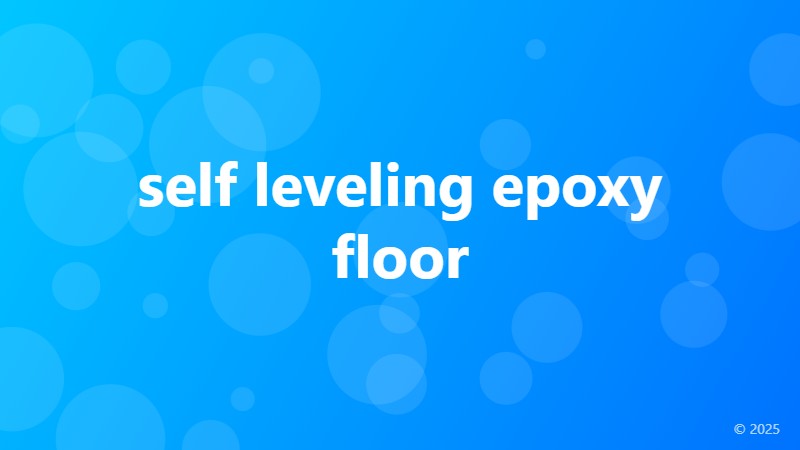self leveling epoxy floor
 ```html
```html
What is a Self-Leveling Epoxy Floor?
A self-leveling epoxy floor is a type of flooring system that uses a specially formulated epoxy resin and hardener mixture. This mixture, once combined, self-levels to create a smooth, seamless, and incredibly durable surface. Unlike traditional flooring options like tile or concrete, a self-leveling epoxy floor requires minimal preparation and offers a stunning, contemporary finish. This makes it a popular choice for both residential and commercial applications.
Benefits of Choosing a Self-Leveling Epoxy Floor
There are numerous advantages to installing a self-leveling epoxy floor. Its seamless surface prevents cracks and crevices where dirt and bacteria can accumulate, making it exceptionally hygienic and easy to clean. This is particularly beneficial in environments like garages, workshops, and food processing facilities. Beyond hygiene, self-leveling epoxy floors are also incredibly durable, resistant to chemicals, stains, and impact damage. They can withstand heavy foot traffic and even withstand the weight of vehicles in a garage setting.
Different Types of Self-Leveling Epoxy Floors
Not all self-leveling epoxy floors are created equal. The type you choose will depend on your specific needs and budget. Some options include:
- Standard Self-Leveling Epoxy: This is a cost-effective option that provides a durable and attractive finish, suitable for many applications.
- High-Build Self-Leveling Epoxy: Designed to cover larger imperfections in the subfloor, high-build epoxy offers excellent leveling capabilities and is ideal for uneven surfaces.
- Metallic Self-Leveling Epoxy: This option creates a stunning, shimmering effect with metallic pigments embedded in the epoxy. It's a popular choice for creating a modern and sophisticated look.
- Quartz Self-Leveling Epoxy: Incorporating quartz aggregates, this type of epoxy offers enhanced durability and slip resistance. It's ideal for areas with high traffic or potential for spills.
The Self-Leveling Epoxy Floor Installation Process
While the "self-leveling" aspect simplifies the process, proper installation is crucial for a long-lasting, flawless finish. The process generally involves:
- Surface Preparation: Thorough cleaning and preparation of the existing floor is paramount. This often involves grinding, patching, and priming to ensure a smooth, clean base for the epoxy.
- Mixing the Epoxy: The epoxy resin and hardener must be mixed precisely according to the manufacturer's instructions. Improper mixing can compromise the final product.
- Pouring and Spreading: The mixed epoxy is poured onto the prepared surface and spread evenly using a notched trowel or specialized tools. The self-leveling properties of the epoxy will then do the rest.
- Curing: The epoxy needs time to cure completely. This period can vary depending on the type of epoxy used and environmental factors, typically ranging from 24 to 72 hours.
Choosing the Right Self-Leveling Epoxy for Your Needs
Selecting the appropriate self-leveling epoxy floor depends on several factors. Consider these points:
- Your budget: Prices vary considerably depending on the type of epoxy and the project's size.
- The intended use of the space: A garage requires a different type of epoxy than a showroom.
- The condition of your existing floor: High-build epoxy is necessary for severely damaged subfloors.
- Your aesthetic preferences: Consider the available color options and finishes to achieve your desired look.
Maintenance of Your Self-Leveling Epoxy Floor
While self-leveling epoxy floors are incredibly durable, proper maintenance will prolong their lifespan. Regular sweeping and occasional mopping with a pH-neutral cleaner are usually sufficient. Avoid abrasive cleaners and harsh chemicals, as they can damage the epoxy surface.
Finding a Reputable Installer
For the best results, it's highly recommended to hire a professional installer experienced with self-leveling epoxy floors. A skilled installer ensures proper surface preparation, mixing, and application, leading to a flawless, long-lasting finish. Request references and check reviews before making your selection.
Self-Leveling Epoxy Floor Cost
The cost of a self-leveling epoxy floor varies based on factors such as the size of the area, the type of epoxy chosen, and labor costs. It's best to obtain quotes from multiple installers to compare pricing and services before making a decision. While the initial investment might seem higher compared to some traditional flooring options, the durability and longevity of a self-leveling epoxy floor often make it a worthwhile investment in the long run.
```